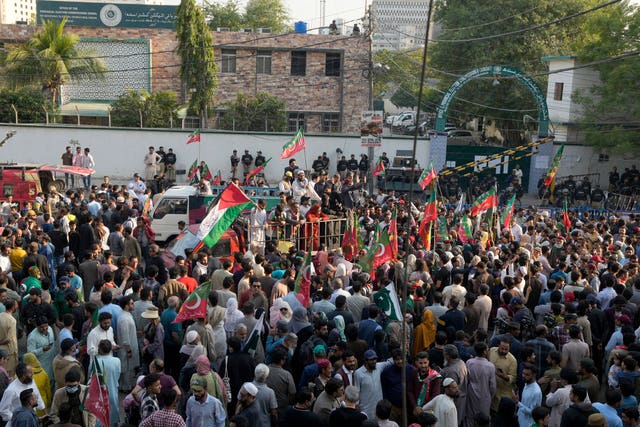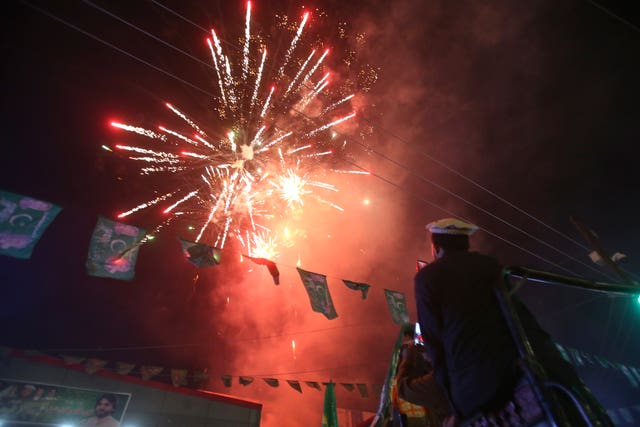
Thousands of supporters of Pakistan’s imprisoned former Prime Minister Imran Khan and members of other political parties blocked key highways and started a day-long strike in the volatile south-west on Monday to protest alleged rigging of last week’s elections.
Thursday’s vote to choose a new parliament was overshadowed by the vote-rigging allegations, an unprecedented mobile phone shutdown and the exclusion of Khan and his Pakistan Tehreek-e-Insaf party (PTI) from the vote.
While election winners were celebrating victory, PTI and other parties refused to accept their defeat in dozens of constituencies.
 PTI and other parties refused to accept defeat in some constituencies, claiming the vote was rigged (AP Photo/Fareed Khan)
PTI and other parties refused to accept defeat in some constituencies, claiming the vote was rigged (AP Photo/Fareed Khan)
Dozens of Khan’s supporters were briefly detained in the eastern city of Lahore over the weekend while protesting alleged vote-rigging.
Jan Achakzai, a government spokesman in the southwest province of Baluchistan, urged protesters to “show grace” by accepting defeat and moving away from the highways.
Khan could not run in the election because of the criminal convictions against him, which he says are politically motivated.
Still, candidates backed by the former prime minister won more seats than the political parties that ousted him from power nearly two years ago, according to the final tally published on Sunday.
No party won a majority, however, so the parties will have to hold talks on forming a coalition government. The new parliament chooses the country’s next prime minister.
 A supporter from Pakistan’s former prime minister Nawaz Sharif’s party, Pakistan Muslim League-N, watches fireworks as the party celebrates the victory of their candidate in Peshawar (AP Photo/Muhammad Sajjad)
A supporter from Pakistan’s former prime minister Nawaz Sharif’s party, Pakistan Muslim League-N, watches fireworks as the party celebrates the victory of their candidate in Peshawar (AP Photo/Muhammad Sajjad)
Candidates aligned with Khan secured 101 out of 266 seats in the National Assembly, or lower house of parliament.
The Pakistan Muslim League-N party (PML-N) led by three-time premier Nawaz Sharif secured 75.
Mr Sharif is currently in talks with allies to form a coalition government.
The Pakistan People’s Party, or PPP, led by Bilawal Bhutto-Zardari, came in third with 54 seats.
One result has been withheld and another vote was postponed because of a candidate’s death.
The campaign to kick Khan out of office in 2022 was led by the PML-N and the PPP.
Pakistan’s military has always cast itself as the ultimate arbiter of who becomes prime minister, and Mr Sharif was marked out as the powerful security establishment’s preferred candidate because of his smooth return to the country last October.
Mr Sharif spent four years in exile to avoid serving prison sentences but his convictions were overturned within weeks of his arrival in Pakistan.


Comments: Our rules
We want our comments to be a lively and valuable part of our community - a place where readers can debate and engage with the most important local issues. The ability to comment on our stories is a privilege, not a right, however, and that privilege may be withdrawn if it is abused or misused.
Please report any comments that break our rules.
Read the rules here